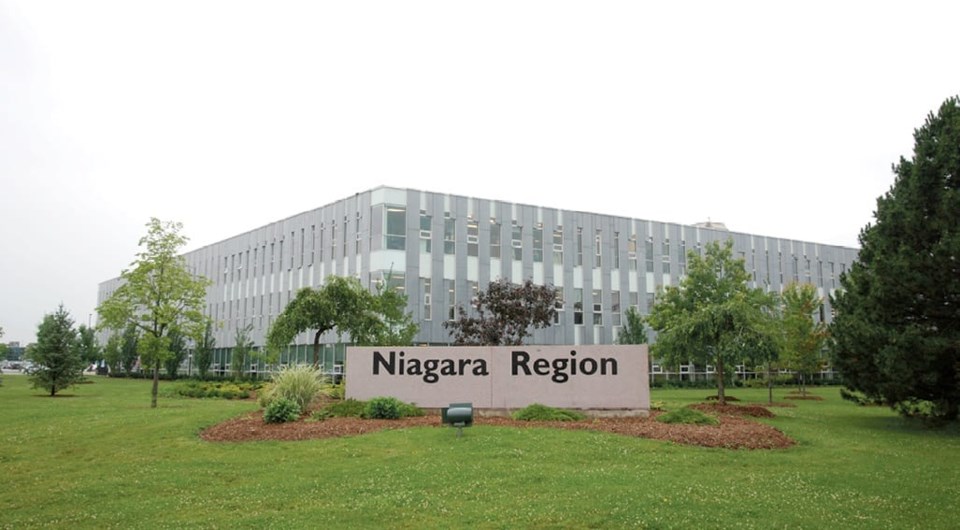BY JOHN CHICK Special to the VOICE
Niagara Region approved its 2019 budget last Thursday, and while regional councilors did not vote themselves a pay cut, they did commit to various infrastructure projects around Niagara. Here are the highlights.
■ Council settled on a 3.8 percent property tax increase, down from the previous proposal of 5.8 percent. This was accomplished, in part, by dipping into the region’s rate stabilization reserve.
■ An average property assessed at $267,711 would pay the regional portion of the tax bill at $1,517, up $56 over 2018.
■ Niagara Regional Council approved $274 million in capital spending for 2019.
■ Council also approved a combined operating rate budget increase of 5.1 percent for water and wastewater services. The budget for waste management services will see an increase of 2.1 percent.
■ The budget includes a separate 1.4 percent levy for Niagara Regional Transit enhancements. That features $13.9 million in spending, including 13 new buses.
■ $21 million has been committed to upgrading the Decew Water Treatment Plant in St. Catharines.
■ $16.1 million towards reconstruction of Martindale Road.
■ $10 million for widening of Casablanca Boulevard in Grimsby.
■ $8.8 million for general road repair.
“This budget reflects Regional Council’s commitment to enhancing services that matter to our citizens, such as transit, while also ensuring that critical infrastructure such as roads, bridges and our water and waste water facilities are kept in a state of good repair,” Regional Chair Jim Bradley said in a statement.
Pelham's councillors split on pay cut
Not voting for a pay cut is not the same as voting for a pay raise.
That’s the message from Niagara Regional Council after members elected to reverse course on an earlier plan to reduce $198,000 from collective remuneration from this year’s budget, approved last Thursday.
The proposed cut was rooted in a Canada Revenue Agency taxation stipulation involving claimable amounts for elected officials at municipal and regional levels. Pelham Mayor Marvin Junkin said the decision wasn’t easy, clarifying the difference.
“I thought about quite a lot on Thursday night when we were debating that,” Junkin said. “We didn’t mean to give ourselves a pay cut, and didn’t want to give ourselves a pay raise.” Junkin voted against the cut.
At the Town level however, Junkin said councilors have accepted the cut.
“Let it be known at the municipal level we didn’t give ourselves a pay raise—we took the cut,” he said, adding that he himself would be remunerated about $2,600 less for his job as mayor.
He added that the workload on Regional Council is substantial.
“Since I’ve been on Regional Council, I can say how much work it takes to stay on top of things.”
Pelham’s other Regional Councillor, Diana Huson, was one of 11 councillors to vote for continuing with the pay cut idea, and said the Region should implement a system like the one that exists in the City of St. Catharines — where the council’s pay scale is essentially based on the average income of local taxpayers.
“I had talked about connecting our pay scale,” Huson said. “That’s more of the model I like. And if we’re not doing our jobs, we shouldn’t be getting an increase in pay.”
The item came as Regional Council lowered its original estimated tax increase to 3.8 percent from 5.8 percent, in part by dipping into Niagara’s rate stabilization reserve. In terms of remuneration, St. Catharines Mayor Walter Sendzik said that councilors are already “underpaid for the number of hours we actually work," according to the St. Catharines Standard.
Huson knows it’s a double-edged sword to access reserve funds.
“You never want to be a councilor who comes in and raises taxes,” she said. “But there’s so many challenges ahead. Previous councils would tap into reserves, and the problem becomes too expensive to fix in the long run.”
Huson also praised several other aspects of the budget, including the hiring of two new Niagara Regional Police officers for its sexual assault unit, and two additional officers for a new human trafficking unit. The Region also kept a $300,000 culture program in the budget in the aftermath of cutbacks at the provincial level.



